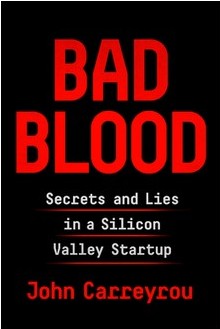By David Zetland (originally published at One-handed economist) Review: Bad Blood I’d heard about this book — the story of the rise and fall of Elizabeth Homes and her company Theranos — long ago, but I only decided to read it when preparing readings for my course, The World of Entrepreneurs. I wanted to understand her case, as an example of the dark side of Silicon Valley — not the side of “fake it until you make it” — but the side of “lie to everyone, about everything, if that gives you an advantage.” Aside: I worked in three start-ups in Silicon Valley, of which two were dominated by frauds of the “funding secured” and “vaporware” models, respectively, so I have a real interest in similar stories. That said, I am pretty sure that at least 80% of
Topics:
Dan Crawford considers the following as important: David Zetland, one, Taxes/regulation, US/Global Economics
This could be interesting, too:
Joel Eissenberg writes How Tesla makes money
Angry Bear writes True pricing: effects on competition
Angry Bear writes The paradox of economic competition
Angry Bear writes USMAC Exempts Certain Items Coming out of Mexico and Canada
by David Zetland (originally published at One-handed economist)
Review: Bad Blood
 I’d heard about this book — the story of the rise and fall of Elizabeth Homes and her company Theranos — long ago, but I only decided to read it when preparing readings for my course, The World of Entrepreneurs. I wanted to understand her case, as an example of the dark side of Silicon Valley — not the side of “fake it until you make it” — but the side of “lie to everyone, about everything, if that gives you an advantage.”
I’d heard about this book — the story of the rise and fall of Elizabeth Homes and her company Theranos — long ago, but I only decided to read it when preparing readings for my course, The World of Entrepreneurs. I wanted to understand her case, as an example of the dark side of Silicon Valley — not the side of “fake it until you make it” — but the side of “lie to everyone, about everything, if that gives you an advantage.”
Aside: I worked in three start-ups in Silicon Valley, of which two were dominated by frauds of the “funding secured” and “vaporware” models, respectively, so I have a real interest in similar stories. That said, I am pretty sure that at least 80% of start-ups are, on the whole, legitimate (read this review). The trouble is not the really bad apples — Theranos and WeWork being recent examples — but those that cut corners as a “necessary part of doing business” — Facebook and Uber being high on that list.
This review will be short because Carreyrou is such a good writer and the story comes at a fast pace. What strikes me are the following:
- Elizabeth Holmes was an aggressive, ambitious founder who wanted to change the world and become rich and famous. Her challenge was reality. She preferred to ignore inconveniences and distorted reality to convince others that she knew what she was doing, i.e., building a machine that could run 200 blood tests based on a finger-prick sample of blood. Outside scientists told her that her goal was impossible, due to physics and chemistry. Inside scientists, lab workers and “beta-test” doctors said her machine was not working or viable. Rather than listen, she lied about using commercial equipment to do the tests supposedly run on her machines and ignored the dangers of bad results from her machines. (One million tests later deemed “inaccurate” translates into one million stories of false positives, false negatives and needless suffering.)
- Holmes was aided and abetted by Ramesh Balwani, a boyfriend who assumed that his luck (presence) in an earlier start up made him a visionary. Balwani and Holmes bullied staff, fostered a culture of paranoia, and sent lawyers after whistleblowers seeking to protect investors and the innocent. Different product teams were separated, which limited their ability to spot the fraud but also their ability to find solutions. Lawyers like David Boies worked hard to threaten whistleblowers because they were paid in shares. Holmes recruited a bunch of famous old white men (George Schultz, Henry Kissinger, Rupert Murdoch) whose “halo” protected her company from awkward questions.
- The end came when an anonymous insider brought the story to Carreyrou, whose investigations resulted in Theranos’s tests being suspended, arrests and trials. Holmes was not a disruptor; she was caught wearing “the Empress’s new clothes.” The women who saw herself as the next Steve Jobs was actually just another blonde grifter.
- Holmes’s most recent defense is that she’s mentally unfit to face charges. Given her history — and 2019 marriage to the male heir of millions — I assume her defense rests on more lies. (I also worry about her husband, especially if he has a high-value life insurance contract.)
My one-handed conclusion: Read this book if you want a fast-paced story of how self-delusion, greed and privilege (high-priced lawyers who will defend your lies) can allow someone to get away with “statistical murder” (all those wrong tests surely resulted in more than one death). FIVE STARS.
